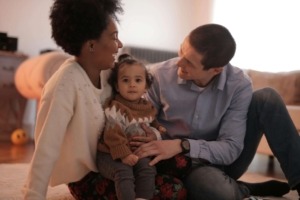How Does Postpartum Anxiety Affect Your Relationship? Insights from a Therapist
Whether you’re a first-time parent or a mom of multiples, parenting is challenging. Postpartum anxiety can happen after any pregnancy, even if you’ve never experienced it before. Some common symptoms are frequent worrying, difficulty relaxing or concentrating, feeling on edge, irritability, or physical symptoms like an increased heart rate, muscle tension, or difficulty sleeping.
During postpartum therapy, I often see it show up for mothers in various areas. These include sleep, reassurance-seeking, and taking on more responsibilities. It’s often difficult for many moms to “sleep when the baby sleeps.” You might find you cannot sleep because you’re frequently checking on the baby or looking at the baby monitor. Another way anxiety can show up is in researching and reading up on concerns related to the baby. This can cause you to spend more time than you would like focusing on such things, maybe feeling more anxious.
Many moms I work with who have anxiety have been managing their feelings by doing more. Taking on every aspect of the baby’s care so they can feel reassured that everything is done “right” and the baby is safe. If you experience this, you may appear like you have it all together. But inside, it feels like you are drowning. Postpartum anxiety can impact your ability to function and to enjoy your life, and it can also affect your relationship.
Ways Postpartum Anxiety Can Affect Your Relationship
Difficulty Communicating
 Moms with anxiety may not realize what they are experiencing. I often hear “I’m failing” or “I’m overwhelmed” without recognition of all that they are doing. Anxiety makes communication difficult. You may not have the words to describe your experience, or find that trying to talk about your emotions causes more anxiety.
Moms with anxiety may not realize what they are experiencing. I often hear “I’m failing” or “I’m overwhelmed” without recognition of all that they are doing. Anxiety makes communication difficult. You may not have the words to describe your experience, or find that trying to talk about your emotions causes more anxiety.
This may lead you to avoid conversations that could help you feel more supported. It can also impact communication around baby’s care, daily chores, or your capacity to listen to and support your partner.
Emotional Disconnect
Having a newborn changes the dynamics of a relationship, and it can shift the ways you connect with your partner. If you are experiencing anxiety, it can be challenging to enjoy moments in parenting that you would like to enjoy. Over time, both partners may feel they are missing out on the shared joy of raising a child together. Sometimes, feeling anxious can leave you wanting reassurance from your partner. This can lead to a dynamic where your partner feels they are “failing” if you still feel anxious after their efforts to comfort you. Postpartum therapy can help prevent long-term mental health struggles while navigating the changing dynamics of parenthood.
Co-parenting & Shared Tasks
 Moms often try to cope with anxiety by trying harder or striving for perfection. In postpartum therapy in Atlanta, I often see moms who worry they aren’t a good mom. The result can look like a mother taking on tasks and baby care that they could be sharing with their partners.
Moms often try to cope with anxiety by trying harder or striving for perfection. In postpartum therapy in Atlanta, I often see moms who worry they aren’t a good mom. The result can look like a mother taking on tasks and baby care that they could be sharing with their partners.
If you’re feeling pressure to “get it right” or have thoughts like “It’s all up to me,” you may find your parenting roles becoming unbalanced. When parenting roles and responsibilities don’t feel balanced to both partners, one person can feel resentful of the work and mental load they carry. Meanwhile, the other partner may feel devalued and viewed as less than competent.
Physical Intimacy Issues
Anxiety can disrupt how connected you feel to your partner, making any emotional or physical intimacy difficult. When you feel anxious and in a constant state of overwhelm, the last thing on your mind is making time for sex. When your nervous system is dysregulated, you cannot be in a relaxed state. That makes it less likely for you to be open to any physical touch. Small acts of physical touch and sexual intimacy contribute to connection in a relationship. It’s completely natural for these needs to vary between partners at different times in the relationship. However, if you feel that this aspect of connection is strained, it is important to address.
Final Thoughts From A Postpartum Therapist
 If you are facing any of these challenges, you are not alone, and you are not to blame. Postpartum anxiety can impact your functioning and change your relationship. As a postpartum anxiety therapist in Atlanta, I’m happy to provide support for you so that you can feel like your best self.
If you are facing any of these challenges, you are not alone, and you are not to blame. Postpartum anxiety can impact your functioning and change your relationship. As a postpartum anxiety therapist in Atlanta, I’m happy to provide support for you so that you can feel like your best self.
We can also address challenges that you feel are impacting your relationship. Therapy can provide education about symptoms and normalize your experiences. That way, you can be better able to identify and understand what is happening, both internally and in your relationship.
Postpartum Anxiety: Seeking Help In Atlanta
A good postpartum therapist will listen to your concerns, support you in recognizing your needs, and help you create solutions with your partner. At Informed Therapy Group, we have postpartum therapists who specialize in anxiety and are experienced at helping moms navigate relationship challenges. We can provide you with the postpartum counseling and support you need as you build a stronger connection with your partner. Here’s how you can reach out:
- Call (404) 444-8974 or email info@informedtherapy.com to schedule a free consultation
- Meet with one of our experienced postpartum therapists in Atlanta, GA
- Start feeling like yourself again while bonding with your baby and partner
Other Services Informed Therapy Group Offers In Georgia
Informed Therapy Group takes a multifaceted approach to therapy, catering every approach to individual client needs. Our compassionate therapists encourage you to reach out and start getting the support you need. In addition to postpartum therapy in Atlanta, GA, we also offer anxiety therapy, depression therapy, grief and loss counseling, and stress management counseling. We also provide pregnancy counseling, couples therapy, and neurodivergent-affirming therapy. Explore our website to learn more about us and read through our therapy blog and FAQs for more insight. When you’re ready, we encourage you to contact us to begin your unique mental health journey.


